Released: 13th October 1997
Writers: Søren Rasted / Claus Norreen / René Dif / Lene Nystrøm
Peak position: #1
Chart run: 2-1-1-1-1-2-3-3-3-6-7-10-18-24-31-34-36-39-45-57-60-58-63-70-X-X-66-73
Chart run (2023): 40-42-50-57
Billboard Hot 100 chart run: 7-9-9-11-16-29-43-55-59-67-77-83-95-99-94-100
Aqua made an international breakthrough in 1997 with Barbie Girl, earning themselves a place on the all-time best-sellers list in the UK…and a hefty lawsuit from Mattel.

The origin of Aqua goes back to 1994 when Søren Rasted and Claus Norreen were hired to produce the soundtrack for a Danish film Frække Frida og de Frygtløse Spioner (Naughty Frida and the Fearless Spies). Among the singers who contributed to the album was René Dif, an aspiring DJ with a penchant for rapping over his sets. The trio decided to continue working together and soon began searching for a female vocalist to round out the group. René happened across Lene Nystrøm singing on a ferry and approached her to join. The quartet formed Joyspeed, signed to a small record label (XM) and released their first single – Itzy Bitzy – in 1995. The track was not a success, and the group departed XM to refine their sound, ditching the name Joyspeed. Nonetheless, the fundamentals were now in place, with Søren and Claus assuming production duties, René rapping, and Lene performing lead. They put together a demo (which included a version of Barbie Girl) and eventually landed a major deal with Universal Records in 1996.
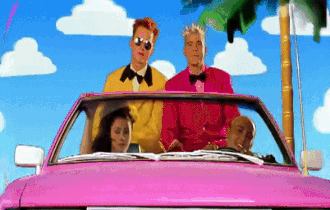
After rebranding themselves Aqua, the group released Roses Are Red later that year in Denmark and immediately experienced a different reception to the one they’d received before. The track peaked at #1, while their success intensified with the follow-up, My Oh My and debut album, Aquarium. However, it was Barbie Girl that proved a turning point as Universal – buoyed by the group’s popularity – opted to launch them internationally with the track. Indeed, such was the label’s confidence that after initially focusing on mainland Europe, by mid-1997, the single had already made a sizeable impact in America. The UK release, by comparison, was left until much later in October 1997. That may have been intentional; it made sense not to overextend Aqua further since they were already promoting relentlessly. However, the timing also coincided with the end of a sombre period where Elton John had been #1 for five weeks with Something About The Way You Look Tonight/Candle In The Wind 1997 following the death of Diana, Princess of Wales. Barbie Girl might still have been a hit had it arrived earlier in the UK. However, it’s also possible that the reaction – certainly from media outlets – would’ve been more muted because of the glaring contrast to how the national mood was otherwise portrayed.
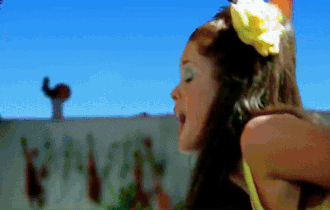
There are many reasons why Barbie Girl works so well; even critics inclined to dismiss the track as a novelty couldn’t deny how well-constructed it is. But that unfamiliarity added to the intrigue and curiosity in territories like the UK, where Aqua were previously unknown. From start to finish, Lene Nystrøm and René Dif are Barbie and Ken; his gruff voice and her high-pitched vocals suit their respective characters perfectly. There was no point of reference for whether that’s how they actually sounded or if it was all part of the performance. In actuality, it was somewhere in the middle. Lene’s natural tone is lower, but the group made a stylistic choice that her singing higher would better fit their material and make it more distinctive (which it did). Yet, Barbie Girl takes that to a further extreme and did so just before pitch-correction software became widely popularised, giving the song a unique, fantastical quality that sells the concept. Even now, what Lene achieves with her voice naturally is a significant factor in what makes Barbie Girl so compelling. It’s human enough to try and sing along with, yet near-impossible to mimic.
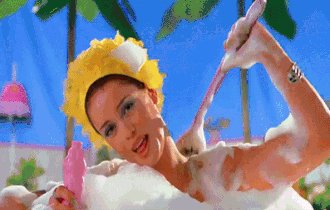
Furthermore, the time Aqua took after Itzy Bitzy to leave XM and re-examine their formula feels particularly pertinent to the arrangement of Barbie Girl. In a different context, if this were merely a novelty song designed to capitalise on a popular franchise predominantly marketed towards children – like many other such singles in the ‘90s – then the temptation would be to make it about Barbie, specifically. And, in many respects, it is. However, René also has a large presence throughout as Ken. The co-ed angle creates one of the catchiest hooks: “Come on, Barbie, let’s go party (ah ah ah yeah), come on, Barbie, let’s go party (ooh-oh, ooh-oh)” and ensures that, as a party track, Barbie Girl has something for everyone to do, rather than solely targeting one demographic. Even if Aqua might never have predicted just how ubiquitous the song would become, it wasn’t totally serendipitous; they innately understood how to play to their strengths and broaden the potential fanbase of their material.
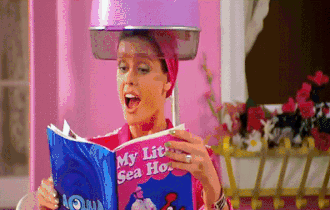
And that’s true in how they approached the theme; Barbie Girl is a masterclass in subtext. There’s a thinly veiled sexual undertone throughout: “You can touch, you can play, if you say I’m always yours” that doesn’t shy away from what many critics of Barbie would argue the doll represents: “I’m a blonde bimbo girl in a fantasy world, dress me up, make it tight, I’m your dolly”. René’s retort emphasises that objectification: “You’re my doll, rock and roll, feel the glamour in pink, kiss me here, touch me there, hanky-panky”, although any social commentary that might be read into the song never dominates at the expense of pop sensibility. Moreover, it was inevitable that Barbie Girl would attract the attention of a younger audience, and there’s nothing so derisive about the track that means lyrics like: “Make me walk, make me talk, do whatever you please, I can act like a star, I can beg on my knees; come jump in, bimbo friend, let us do it again, hit the town, fool around, let’s go party” can’t be taken at face value.

Ultimately, Barbie Girl never comes off as disrespectful to the Barbie brand. Instead, the song feels fondly tongue-in-cheek, and while Mattel protested at the unauthorised use of their most well-known product, Aqua crafted an enduring earworm of a chorus: “I’m a Barbie girl in the Barbie world, life in plastic, it’s fantastic, you can brush my hair, undress me everywhere, imagination, life is your creation” that, quite frankly, is better than any advertising jingle the company could’ve commissioned. And therein lies what Barbie Girl best showcases: Aqua’s penchant for creating hooky, seamless bubblegum pop melodies. The ostensible simplicity of the execution – coupled with the Eurodance production – belies the skill they consistently demonstrated. Barbie Girl did, at least, get the credit it deserved, but the group’s talent extended far beyond this song, even if it is one of the best examples of what they could do with a concept.
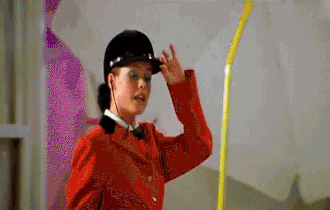
When Aqua launched in America, their label, MCA (a subsidiary of Universal), did add a cautionary disclaimer to the single and album artwork, which read: ‘The song “Barbie Girl” is a social comment and was not created or approved by the makers of the doll’. However, that wasn’t enough to stop Mattel from filing a lawsuit against MCA for breach of copyright. They alleged that the reputation of the Barbie brand had been tarnished by turning the doll into a sex object, that the song negatively impacted their marketing plans, and the single artwork used a particular shade of trademarked ‘Barbie pink’. MCA retaliated with a countersuit for defamation after Mattel likened them to a bank robber who’d committed a heist on their property. The case took five years to resolve, but in 2002, a judge advised both parties to ‘chill’, deeming that Barbie’s enduring fame meant the brand was liable to social commentary and parody, which is precisely what Barbie Girl had declared itself to be. Ironically, Mattel licensed the song (with revised lyrics) for their own advertising campaign in 2009. It also appeared on the 2023 soundtrack to the Barbie movie, albeit only as a sample in Barbie World by Nicki Minaj and Ice Spice.
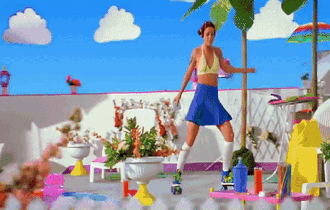
It never seemed that Aqua or their label were overly minded by the threat of legal action from Mattel. Nonetheless, it’s probably a good thing that the music video was created before any formal complaint was made because the visuals dip strongly into the aesthetic and conventions of the Barbie brand. Director Peder Pederson was not a fan of the song after hearing it on the radio; however, after being approached to work on the video, he accepted and developed a treatment that would bring Barbie Girl to life based on the ideas that Aqua used to create the song in the first place. There was, however, one sticking point: the treatment initially involved Lene Nystrøm wearing a blonde wig to play the role of Barbie, which she refused to do, and rightly so. It might seem like a minor point, but one that could potentially have pushed Barbie Girl firmly into novelty territory. The styling is still heavily influenced by the dolls, but retaining Lene’s natural hair colour gives Aqua a distinct identity within a visual that otherwise borrows much of its iconography from Barbie, as was Peder Pederson’s ambition.
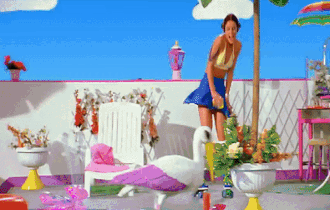
The video portrays Aqua in a world that credibly resembles one Barbie would inhabit. It’s incredibly well-designed, with deliberately artificial-looking surroundings and a vivid colour scheme filled with shades of pink, yellow and blue. Lene and René immerse themselves in the characters, exuding a natural chemistry and screen presence, which forms a basis for the humour that’s present in the visuals. Barbie Girl doesn’t labour the point of trying to play satirically for laughs. Some sequences are funny, though – like Lene’s doll-like arm falling off during a group dance – because Aqua react to the absurdity in which they’re performing and maintain an awareness of the artificiality. The video remains an enduring and integral part of Barbie Girl’s success; it was uploaded to the group’s YouTube channel in 2010 and has since been viewed more than 1.5 billion(!) times. It’s a perfectly realised aesthetic that turned a song already brimming with hit potential into an unstoppable pop package.
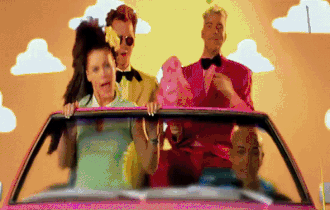
Aqua achieved impressive first-week sales of 183,000 for Barbie Girl in the UK. However, going up against the Spice Girls’ Spice Up Your Life – which sold 321,000 copies – they had to settle for the #2 spot. That didn’t last long, though, because Aqua rose to top the chart the following week and remained there for a month with consistently high sales (190,000 / 239,000 / 190,000 / 165,000). Indeed, if the circumstances were different, Barbie Girl would comfortably have been the biggest-selling single of 1997, with 1.59 million copies. However, everything else that year paled in comparison to the 4.77 million sold by Something About The Way You Look Tonight/Candle In The Wind 1997. Nonetheless, Barbie Girl quickly cemented its place in UK chart history not just as a big hit but as a phenomenon. It was the fifth-highest-selling single of the ‘90s (1.86 million copies) and remains in the all-time top 40, whether both in terms of pure sales and combined streaming units. In 2023, following the release of the Barbie movie, Aqua re-entered the top 75, reaching #40.
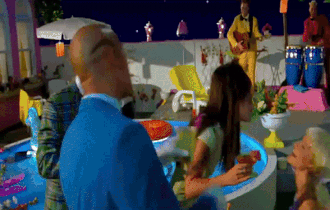
In America, Barbie Girl made an immediate impression, entering the Billboard Hot 100 at its peak of #7 (incidentally, that’s the same position achieved by Barbie World in 2023). The song spent three weeks in the top ten, and though it descended steadily thereafter, Aqua had done enough to generate interest in Aquarium. It debuted at #15 before climbing to the same peak as the single (#7) a month later. Unlike most other territories, where Doctor Jones was released as the follow-up, MCA opted for Lollipop (Candyman) in America instead. The song wasn’t as big of a hit – reaching #23 – but kept the album ticking over to eventually be certified for sales of three million copies. Meanwhile, in the UK, Aquarium entered the chart at #14, though it later climbed to #6 and went on to sell more than 500,000 copies.
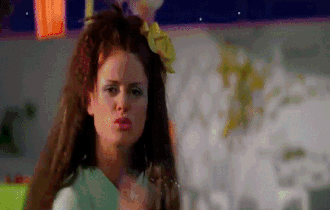
Barbie Girl is – and more than likely always will be – Aqua’s best-known hit. However, their success continued with a further two consecutive #1 singles in the UK. More than anything, this is a masterclass in how to write a pop song with a genius angle and commit fully to the execution of it. Mattel might’ve cried foul, but Aqua made Barbie a pop culture phenomenon again on a scale that wouldn’t be seen for another 25 years.



